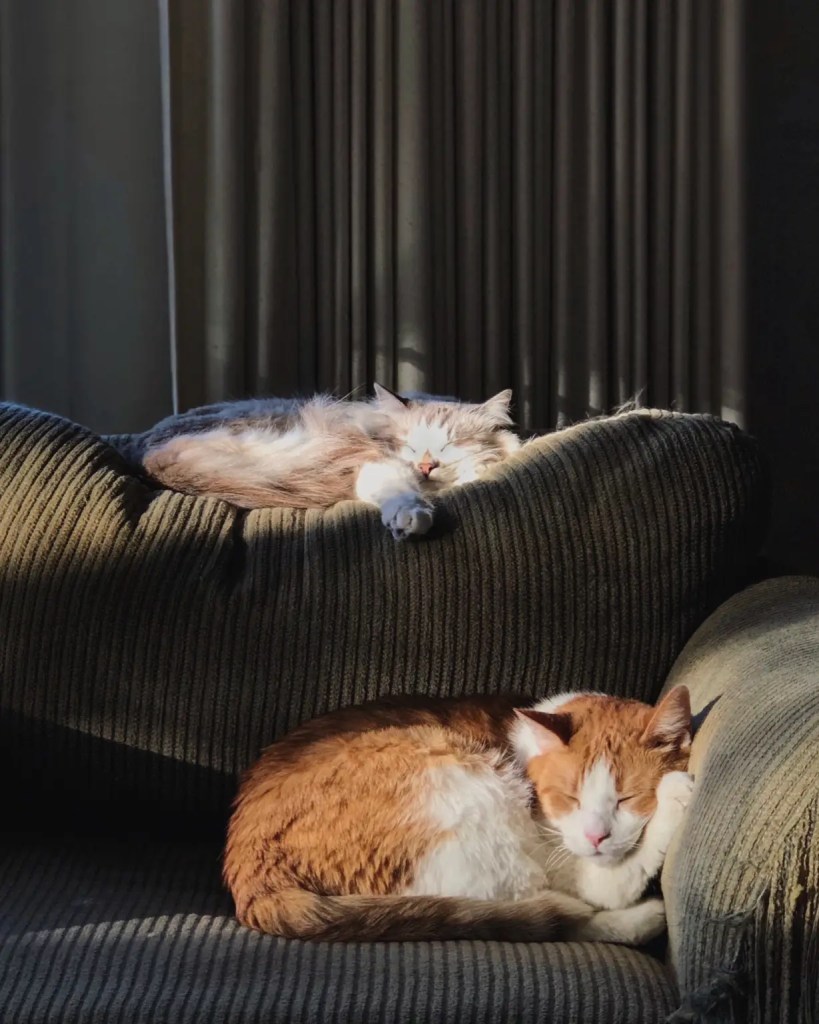
New Kitten at Home? How To Help Your Cats Make Friends
21 Feb 2022.
Bringing a new kitten into the home is always an exciting experience and can be a great addition to your current feline’s life. Providing Mr Whiskers with a furry companion is especially great if you work outside the home, or if you plan to travel. Your kitties can keep each other entertained in between visits from the cat sitter! However, you want to be sure first that your cats will make friends and not enemies.
Thinking of adding a fur friend to your life but not sure how your cat will react? Below, Cat in a Flat breaks down how to help your cats make friends when there’s a new kitty in the household.
Table of contents
Can my cat make friends with a new cat?
Compatibility is a major factor in whether your cats will be able to make friends. So, take plenty of time to seek out a compatible furry companion—this is a must if you hope to achieve a peaceful multi-cat household! Is Mr Whiskers an active kitty who enjoys playing and hunting? Then most likely he will get along with another feline with a similar personality. Is your cat chill and prefers spending time with quiet people? Ensuring that both kitties have similar personalities will make it easier for your cats to make friends.
One accurate compatibility test is to check that there isn’t a huge age gap between your two fur friends. For example, introducing a very young cat and an older cat is rarely a good idea. Your older feline will probably feel overwhelmed by a kitten’s energy, and this can create tension and stress for them. On the other hand (or paw), a playful kitten will quickly grow bored with an older cat.
Age, breed and gender all play big roles in finding the purrfect buddy for your fur friend. Similar age, breed and gender means both cats will have personality traits that will make them more compatible.

How to prepare your home for a new cat
Introducing a new kitty will take patience, so don’t expect your cats to make friends overnight. Make sure you do some prep work before your new kitty even sets a paw in the house. This will ensure that the introduction between the cats is seamless and stress-free for everyone (including you!).
Here is what you should have on hand when preparing to introduce a new cat to your cat:
- A lattice door or a baby gate. Although you won’t need this right away, it will be useful to have when you’re ready to start socializing the two kitties.
- Separate food and water bowls. It’s a big no-no to expect your cat to share resources with a new fur friend. Sharing food and water is a sure recipe for an unhappy cat and may result in some tense spats!
- At least one dedicated litter box for each cat. Felines are clean creatures and having access to multiple toilets is important for their well-being. If they don’t, our fur friends may develop painful physical ailments like cystitis due to stress.
Tip: If you work outside the home, it might be a good idea to either take a break or work from home for a few weeks to help your felines adjust.
What’s the best way to introduce two cats?
Step 1: Keep the cats separate
You don’t want to introduce the new cat too quickly into a home where a feline already lives. This is a sure way for your cats to not make friends, but enemies! If possible, keep each kitty in their own separate room. Our fur friends can be very territorial and need time to adjust to a new cat in their space.
Step 2: Get them used to new scents
You’ll need to give your kitty time to get used to the smells of their new home, while at the same time acclimating your cat to their new fur friend’s scent. Start by rubbing each cat with a separate towel. Then place the towels in the opposite cat’s area. Give each kitty space to approach and smell the other cat’s scent in their own time.
Step 3: Let the cats see each other
After several days of living in separate rooms and getting used to each other’s scent, it’s time for your cats to take the first big step to becoming fur friends. This is where the latticed door or baby gate comes in handy. You want to allow both kitties the ability to retreat to a safe space if they want to, so don’t push them to be in the same room together just yet. Instead, let them approach and look at each other through the latticed door. The gate will also protect your fur friends from sudden attacks or angry swipes.
Tip: At this stage, you need to pay close attention to your furry friends’ behaviour. Are they approaching the gate calmly? Do they appear curious? If so, this is a sign your cats are making friends! If they hiss or growl at each other, don’t worry. This is completely normal and just means they are taking a little more time to get used to one another.
Step 4: Increase their time together
Over a period of days, you can increase the time your kitties spend interacting with each other through the latticed door. Eventually, incorporate food into the routine by feeding your cats on each side of the gate. Eating together is a bonding experience for cats. Try giving them treats at the same time too—this helps them to see their interactions together as pawsitive.

When should I let my new cat interact with other cats?
When you should allow your cats to interact in the same space varies from feline to feline. However, if you have been carefully observing your kitties’ behaviour towards each other through the lattice door, you’ll have a fairly good idea of when they’re ready to meet.
The cats should no longer hiss or growl at each other. Observe each kitty’s body language. Is it relaxed when they’re in proximity to the other fur friend? Do they appear curious when they see one another? If you answered yes to both these questions, it may be time to see if your cats can make friends while sharing the same space.
If you are introducing a kitten to your cat, pay special attention to the younger kitty when you open the latticed door. Make sure they aren’t showing signs that they’re afraid. Also, check that each cat has a safe place they can retreat to if they feel stressed or scared by the other’s presence.
Provide positive reinforcement by playing with your cats and giving them treats if they seem relaxed. What should you do if your cats don’t make friends right away, but rather start fighting? Don’t panic, this just means you introduced them too quickly. You’ll need to start the process over again to ensure proper socialization. And remember, your furry friends don’t have to love each other, it’s enough for them to just get along.
Note: As a cat sitter, it’s possible you may get hired to look after a client’s cats while they are still being socialized. It’s important never to make assumptions about whether the kitties are ready to spend time together in the same room. Ask plenty of questions beforehand so you’re clear on what to do or not to do. This will help you to avoid a fur-raising situation while their owners are away.
What to do if your cats aren’t making friends
My older cat won’t make friends with my younger cat
As we mentioned above, age gaps can sometimes cause tension between cats. However, this doesn’t mean that adopting a kitten is out of the question if you already have an elderly fur friend at home. Instead of one kitten, introduce two young cats to your cat. This way the younger kitties can play with each other, and Mr Whiskers will still have some new feline companions. This is one case where two can be better than one!
My cats are fighting
Arguments among cats is a completely normal occurrence. Even amongst a harmonious group of kitties there will be the occasional spat. However, when your cats do fight observe them to make sure one isn’t being bullied by the other. If no blood gets drawn and the cats are relaxed with each other after resolving the argument, everything is probably fine. But if things get dangerous for one or both of the cats you may need to start the socialization process again, or consult an animal psychologist.
Note: Giving away a cat should be the very last resort. It’s important to plan before bringing a new cat into the home. Take your time finding a suitable fur friend for your cat and don’t rush the socialization process.
Looking for tips on how to introduce your cat to a dog or to children? The Cat in a Flat blog can help!
- #cat behaviour
- #catinaflat
- #catsitting
- #pet care
- Cat Care


